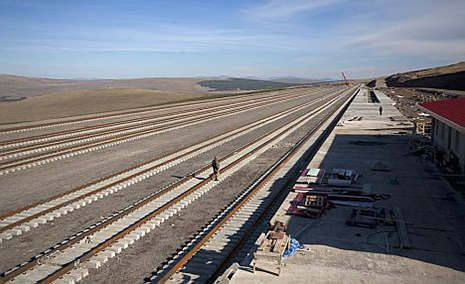The importance of Baku - Tbilisi - Kars railway for the development of interregional trade

Trade emerged as a consequence of people`s desire to meet their needs. People have tried to obtain the goods and services they do not have from others since ancient terms. In terms of human history, the first form of trade was barter. After money was invented, trade became easier and more widespread. Initially trade was on a local scale, later it became interregional and then international. In the Middle Ages, there was spice and silk trade from the Far East to Europe via caravans; this route was called the `Silk Road`. Thus, international trade has a significant role in the development of the national economies. The most important pillar of international trade is transportation. Delivering goods to buyers in a fast, cost-effective and safe way is vital for international trade.
In this regard, the historical Silk Road, which had a crucial role in transportation between Far East and Europe, is being revived with Marmaray and Baku-Tbilisi-Kars projects. The Marmaray Project is a promising initiative which was first put forward by Ottoman Sultan Abdulmecit in 1860 in order to link two continents beneath the sea. One of the two key pillars of the Modern Silk Road was completed when the centuries-old project was put into service on October 29, 2013. The Baku-Tbilisi-Kars railway project constitutes the second pillar of the Modern Silk Road, and was developed by the trilateral Azerbaijan-Georgia-Turkey partnership. The railway has a total length of 826 kilometers and an annual transport capacity of 3 million passengers and more than 20 million tons of goods. The project is expected to be operational in late 2014.
When Baku-Tbilisi-Kars railway project is up and running, there will be an uninterrupted rail route from the Far East to Europe: all the way from China to Britain. Currently, cargo transportation from the Far East to Europe is conducted by air and by sea. As aviation transport costs are high, maritime transport is preferred for bulky and/or heavy goods. By maritime transport, ships arrive in Europe a minimum of 35-38 days after leaving the commercial ports of China such as Shanghai, Ningbo and Qingdao. This will be reduced to just 13 days with the Baku-Tbilisi-Kars rail line, which will massively increase the trade volume between Europe and Asia; goods will be delivered to end-users in a short period of time, and this will accelerate the circulation between purchase and sale.
In addition, the Baku-Tbilisi-Kars railway will not only reduce the transport time, but also minimize the majority of the risks arising from marine transport. It is important to consider the risks of marine transport, as they extend the transport time and threaten the safe delivery of the goods to the buyers. The key risks are as follows:
1- In maritime transport, there is a threat of hijacking. Considering that approximately 350-400 hijacking incidents occur annually on maritime transport routes between the Far East and Europe, this problem is clearly a serious one.
2-In poor weather conditions, navigations may be cancelled, prolonging the transit time of the ship. In March this year, 6 ports in Egypt were shut down due to a sand storm.
3-In stormy weather, goods on the ship may be destroyed due to lurching, or waves may cause damage or corrosion to goods which are not water resistant.
4- Ships may be plundered or exposed to delays during wartime or strikes. At “Port Said” port in Egypt, where the majority of ships sailing from Far East to Europe transfer, remained nonoperational for lengthy periods during strikes and demonstrations, which prevented ships from approaching the port. Under such conditions, goods may not reach their destinations on time and production may be delayed, which will cause customers dissatisfaction and ultimately financial losses.
However, most of the risks resulting from current transport methods will be minimized when the BTK railway is put into service after Marmaray. Moreover, as time and distance will be reduced, export companies will not face “over stocking” problems. Such problems arise because companies must consider the lengthy transport periods along with the above-mentioned risks associated with marine transportation, as therefore they “over stock” in order not to lose their customers in case they cannot meet their needs. However, there are certain costs and risks of keeping “over stock”, as listed below:
1- Risks arising out of fluctuation in exchange rates: over stocking entails a huge risk as buying rates and selling rates will change; stored goods are generally surplus and when exactly they will be sold is largely uncertain. Stored goods may be sold even one year later, which means that the amount paid for stock will change, and the cost will increase due to exchange differences. For example, if goods purchased for the rate of 1 USD=1.75 TL one year ago are sold for the rate of 1USD=2.05TL today, there will be around 15% difference in the exchange rates; this automatically increases the cost by15%. When we add the annual inflation rate, the loss is even greater.
2-Generally, companies are obliged to rent storage spaces for surplus stock, which is directly added to the cost of goods. Increasing costs means increasing product prices, and increasing product prices mean consumers have to pay higher prices.
However, given that the transit period will be three times shorter with the BTK railway, and the risks in marine transportation will be minimized or even eliminated. This will dissuade buyers from keeping surplus stock, thereby protecting them from unnecessary risks, which in turn will favorably affect the cost of the products.
In addition, railways can reach areas where marine transport is hard or even impossible. Railway is also the most environment friendly transport method.
Thus, the BTK railway will rapidly develop interregional cooperation and trade, contribute to economic growth, and significantly boost the GDPs of those countries. Growing economies will have a positive impact on social welfare, which will contribute to peace and stability in the region.















































